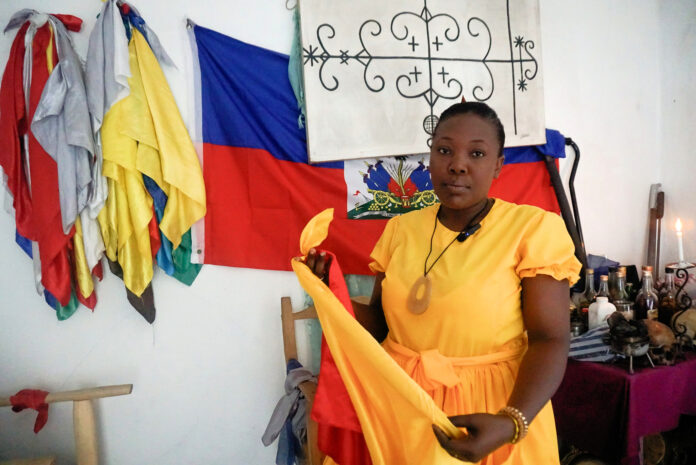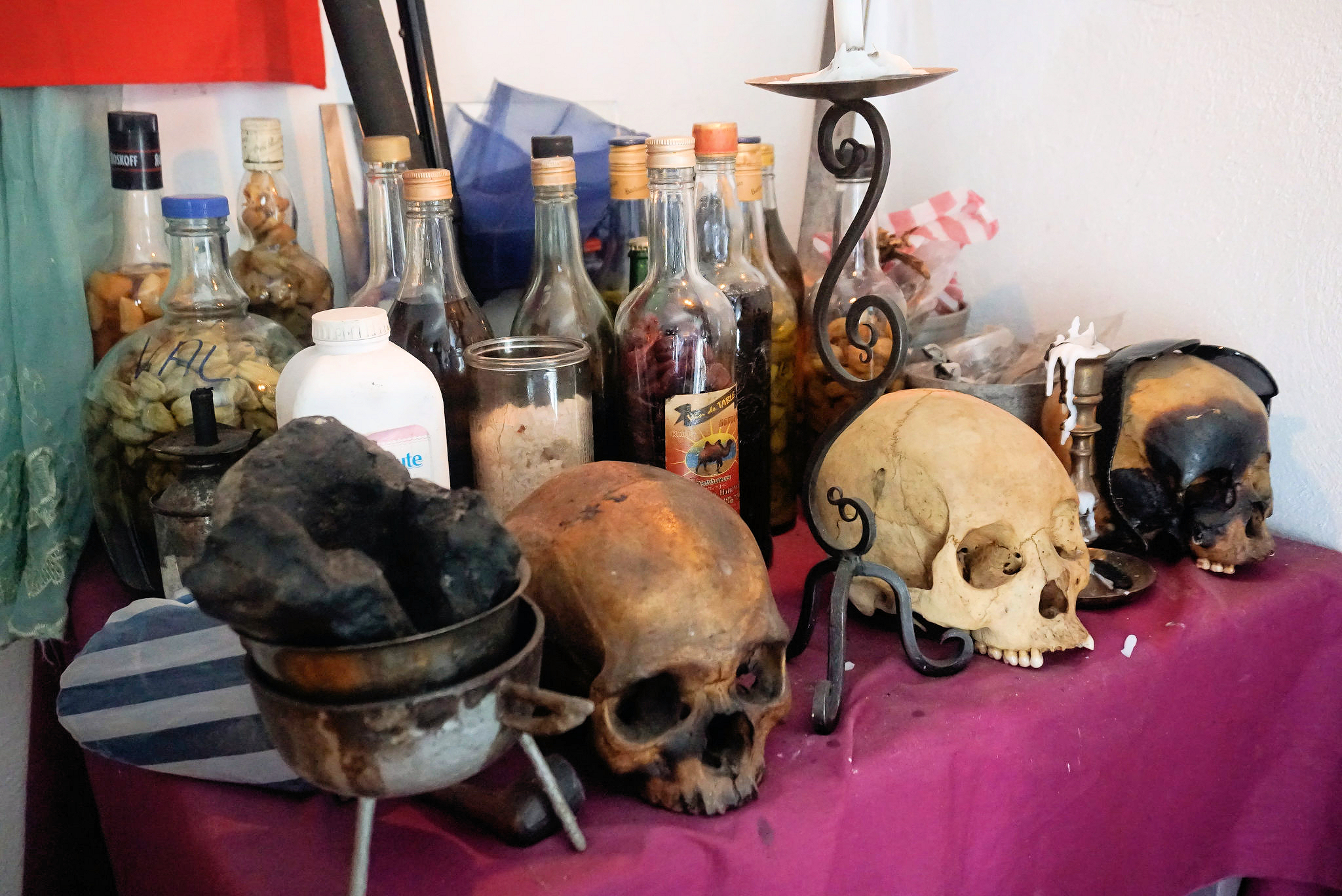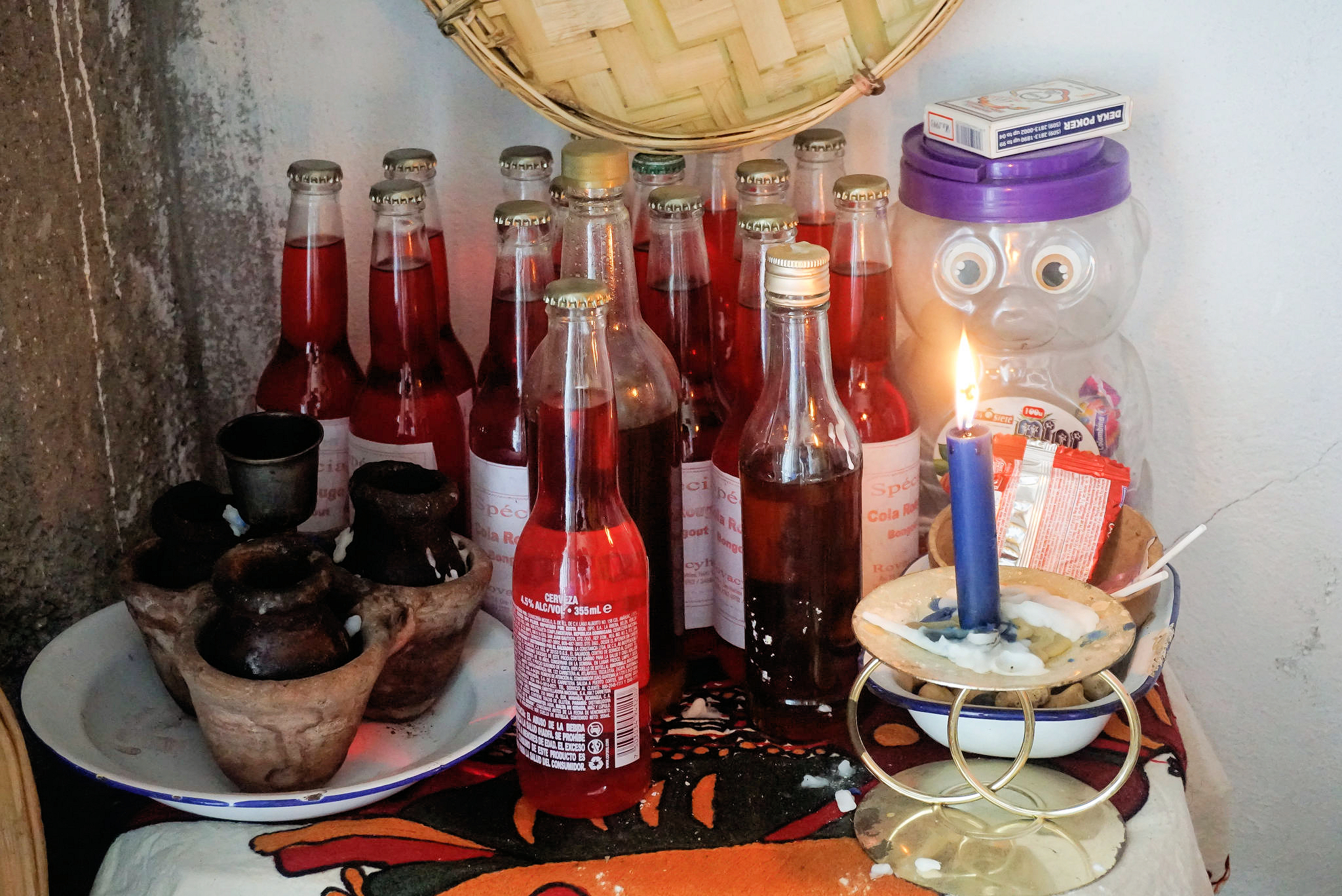
Recent tragic events in Port-au-Prince’s Cité Soleil neighborhood of Wharf Jérémie have once again thrust into the limelight Vodou, a ubiquitous religion in Haiti. Although evangelical Protestantism and Catholicism remain widely practiced, their influence is not as widespread or profound as Vodou’s. This recent article from Global Press Journal helps explain why the religion remains so enduring.
Kim Ives
In 2010, Eunode Eustache Cénatus’ boyfriend invited her to a Vodou ceremony. Although born into a Christian family, she accepted the invitation — and kept attending similar ceremonies each Sunday. The two were students at the University of Port-au-Prince at the time and would later marry.
About a year after she started attending the ceremonies, Cénatus, 37, says she started feeling the presence of the Lwa. These are spirits worshipped by Vodouists, or people who practice Vodou. The Lwa reminded her she was one of the chosen ones, and was born to be a Mambo, or a priestess.
“I didn’t know it until then, but you are born a Mambo. You don’t become one,” Cénatus says.
In 2012, Cénatus founded the Maison Dahomey, a society of people who practice the Vodou religion, and became its Mambo. She runs the society with her husband, its Hougan or priest. In the society, Cénatus teaches Vodou religious and cultural practices.

“When I am possessed, it’s as if the spirits are telling me what to say or do. I am sometimes aware of it, but other times I lose all knowledge and memory of what I’m doing or saying until I’m no longer possessed,” she says.
Cénatus believes that running the Maison Dahomey society is her life’s mission. In 2021, she turned down a lucrative government position that would have required her to move to Port-au-Prince, Haiti’s capital, because her Lwa did not agree, and because she could not manage the society while there.
Despite a history of marginalization, Vodou, a Haitian religion believed to have originated in West Africa, is increasingly common in Cap-Haïtien, Haiti’s second-largest city, on the northern coast. Young people, transitioning from religions like Christianity, are now openly asserting their Vodou beliefs and joining societies such as the Maison Dahomey, which has over 500 members. About 300 of them are under 30 years old.
Paul Michelin Jules, chairman of the board of the Legphibao Vodou society, says although Vodou societies have always existed in Cap-Haïtien, recent years have seen an increase in practitioners, particularly among the younger generation. For example, 55% of the 800 members of the Legphibao Vodou society are under 30.
Sources who spoke to Global Press Journal say the city currently has nearly a dozen Vodou societies.
As Vodou was born from a society where enslaved people did not learn to read and write, much of its history is not written down. Some scholars, however, trace its roots to the transatlantic slave trade in the early 1500s, when Spanish and French colonists brought enslaved Africans to Haiti to work on sugar plantations.
Many of the enslaved people spoke different languages and had different religions. Vodou emerged as a syncretic belief system that adopted elements from these different religious practices. Enslaved people mostly practiced it in secret, away from the watchful eyes of plantation owners and administrators, according to a study published in 2001 in the journal Comparative Studies in Society and History.
“Vodou helped the Haitian people to overcome slavery and colonization. It can still help us out of this alarming impasse.”
During the Haitian Revolution from 1791 to 1804, when Haitians revolted against French colonial rule, this adapted religion played a significant role. Vodou provided a space for enslaved people to meet and foster political and cultural thought. It was also a platform for advocates of independence to share their ideas. This fueled the Haitian revolution, which was the first ever successful slave revolt in history.
“For these black people from different countries and tribes, Vodou was not only a means of communication, but also a way to resist slavery and oppression. It was largely thanks to Vodou they were able to reach freedom and independence a few years later,” anthropologist and sociologist Jocelin Bertil, says, referring to the Bois Caïman Vodou ceremony in 1791, which scholars believe launched the Haitian revolution.
Despite this significant historical, cultural and political role, Bertil says Vodou has been historically misunderstood, marginalized and degraded, largely due to anti-superstition campaigns. These campaigns, which took place in the 1940s, were launched by the Catholic Church to discredit Vodou. Local priests burned Vodou ritual objects and converted Haitians to Catholicism.
But even before these anti-superstition campaigns, Vodou had already faced a long history of denigration. For example, after Haiti’s successful war of independence in 1804, colonists partly attributed the start of the revolution to Vodou, according to a report from the Institute on Religion and Public Policy.
In independent Haiti, some governments banned it in favor of Catholicism. Jean-Pierre Boyer, a revolutionary leader who became president, banned the religion in 1835. Although Faustin Soulouque, who ruled Haiti between 1847 and 1859, allowed Vodou practice in public, Fabre Geffrard, who ruled between 1859 and 1867, suppressed the practice of the religion by destroying Vodou items and signing the Concordat of 1860, which declared Catholicism Haiti’s official religion. In fact, only after signing the Concordat did the Vatican finally recognize the Haitian government.
This denigration of Vodou has continued over the years, with films and other stories still depicting Vodou as harmful, says Frédérick Julemus, an artist who has been a Vodouist since 2020. He gives the example of “Miracle of Faith,” a Haitian film that promotes Christianity and portrays Vodou as evil.
Although there was some support from François Duvalier, president between 1957 and 1971, who brought Vodou priests and priestesses into his service, it wasn’t until 2003 that Vodou became a formal religion in Haiti.
Despite the vilification, Haitians, especially young people, have shown a growing interest in the religion in recent years, says Cénatus, who, in addition to running the Maison Dahomey society, lectures at several universities in Cap-Haïtien to supplement her income.
While some practice Vodou individually, others join societies, which, Cénatus says, provide security and community.
The Maison Dahomey is housed in the same apartment where Cénatus lives with her husband and their son. The society occupies two rooms: one where trainings and rituals take place and a sacred room called a badji, filled with symbols of spirits, where Cénatus receives members for consultations.
For one to be admitted to the Maison Dahomey — which takes its name from an ancient west African kingdom — one must be invited by a member, then submit identity documents and two passport photos. There are also principles one must agree to abide by. For example, members are not allowed tattoos, jewelry or dreadlocked hair. Cénatus says these elements can hinder communication with the Lwa.
The society has three main classes: proselytes, cadets and initiates. New members join the proselyte class, where they learn about Vodou, participate in rituals, study, and then take theoretical and practical exams before moving on to the next level.
The last step, however, is the most important, Cénatus says. “When one is initiated, one is part of the spiritual elite of the Maison Dahomey. It is the Lwa themselves who have chosen those who must receive the initiation.”
Many members of the Maison Dahomey are young people who have abandoned Christianity for Vodouism, Cénatus says.
Gregory Daguisan, a computer engineer in his 30s, joined the society in 2018. Before becoming a Vodouist, Daguisan was an Adventist Christian. He says he stopped going to church in 2017, when he was feeling a little lost. It wasn’t easy for Daguisan, who had been a very active member of his church. It took him some time to reflect and make the switch after a friend invited him to the Maison Dahomey in 2018. He continued to attend and was initiated in 2020. At first, his family didn’t support this choice. He says members of his former religious community also discriminated against him.
“It was one of the most difficult moments of my life,” he says. “I had to cut ties with many people who were important to me.”
But it’s a decision he says he’s never regretted.
Daguisan says one factor that has sparked interest in Vodou is the development of curriculum in Haitian universities, especially in the humanities and social sciences. He believes that these disciplines have helped dispel religious prejudices and given Haitians a deeper understanding of Vodou’s significance.
Eddy Toussaint had lived in the United States since 1971 before returning to Haiti to form a Vodou society with his wife. He says young people in Haiti are beginning to see things differently. “With [Vodou] societies spreading more and more in Haiti, young people are realizing that they have been lied to about [Vodou].”
He says forming a Vodou society was one of the main reasons he returned to the country after his brother, who also had a society, died in 2004. “I didn’t choose to come back to Haiti. The Lwa chose me to come and continue the work my brother was doing, just as they chose my brother, who [had] been a Hougan from the age of 7.”
Now, Toussaint’s wife, Rachelle Zéphyrin, is the president, while Toussaint is a priest at the Lakou Sekrè society, which they founded in 2015 in Haut-du-Cap district.

Anyone can become a Lakou Sekrè member, Zéphyrin says, but minors must have permission from their parents or guardians.
“Lakou Sekrè opens its doors to all those who want to integrate,” Zéphyrin says.
The society is housed in a large reforested courtyard, with sacred rooms for the Lwa and a large sacred room for rituals. It has 11 members on its board, of which Zéphyrin is president, and about 30 active members.
Aspiring members must pass a two-month probationary period, followed by a test before initiation day. Julemus, 28, who practices individually, without a society or the guidance of a priest or priestess, says spirits have often guided him in his artistic practice.
Julemus used to be a Christian. In 2014, he joined a seminary to become a Catholic priest, but he was expelled two years later for not respecting established rules.
“Lakou Sekrè opens its doors to all those who want to integrate.”Rachelle ZéphyrinLakou Sekrè society
He admits to feeling a constant presence reminding him that he didn’t belong during his two years at the seminary. After his expulsion in 2016, Julemus spent almost six months working as a Badjikan, an assistant to a Hougan or Mambo, with his uncle in Port-au-Prince.
At first, he did it to make money. “I never paid any attention to the fate that was waiting for me,” he says.
It wasn’t until 2019, two years after entering the Faculty of Fine Arts at the Henri Christophe campus in Limonade, that Julemus joined a Vodou society called Yanvalou, which has since closed due to a lack of economic resources. He still practices Vodou and believes that one doesn’t need to belong to a society to do so.
“I think all religious assemblies, whether it’s Vodou or Christian churches, all have good unique features. You just have to know how to take advantage of them,” he says. “Sometimes I go to Catholic churches because I feel the need for some ritual that is only done in the Catholic church.”
He believes that the influence of new role models has made young people more comfortable with Vodou. He’s happy that the perception of the religion is changing in Haiti and that more people are embracing it. “However, I don’t think that all Haitians are under any obligation to practice Vodou,” he says. “Everyone is free to make their own choices according to their own beliefs and convictions.”
To him, no religion is superior or inferior to another. “I’m a Vodou practitioner,” he says, “but I’ve also gone to church occasionally because churches have very interesting spiritual rites.”
Meanwhile, Bertil believes that the revival of Vodouism could help Haiti emerge from its socioeconomic and political crisis. “Vodou helped the Haitian people to overcome slavery and colonization. It can still help us out of this alarming impasse,” he says, referring to the challenges that have plagued Haiti in recent years, such as the breakdown of institutions, frequent natural disasters and gangs exerting control over more than half the country.
Bertil is convinced that all Haitians are linked to Vodou, and he encourages the young people who choose this path to stay with it, but he also believes that everyone is free to practice the religion of their choice.
This article was first published in Global Press Journal. Verlande Cadet is a Global Press Journal reporter based in Haiti.
TRANSLATION NOTE
Megan Spada, GPJ, translated this article from French.









